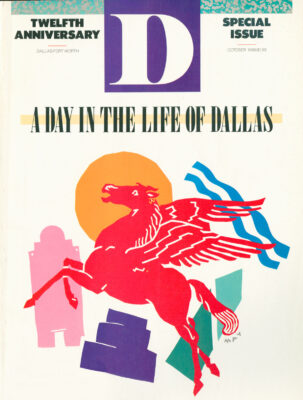At the 4 p.m. third watch briefing at Northwest Patrol Division headquarters overlooking Bachman Lake, no one cuts up, whistles, flirts, or produces Bronx cheers as on TV’s “Hill Street Blues,” The only applause comes when Deputy Chief John Driscoll presents a ten-year service pin to presiding Lt. Raymond Hargrove, who, surprised and slightly embarrassed, beams like a man whose favorite poodle has just won the dog show against popular odds. Before, officers quietly took notes as Hargrove read out news of fellow cops, descriptions of a homeless man reportedly making threats to “kill a policeman,” and possible trouble spots.
Sector Sergeant Dwaine Sides checks out his 12-gauge shotgun and four shells, climbs into his Dodge Diplomat #514, and heads for West Dallas, which is “the only place in town where two cops in a cruiser is required ” says Sides. “We have five two-men squads out here and two sector sergeants. Everybody here volunteers.”
The sixty-one-square-mile Northwest Division extends from the Dallas North Tollroad at L. B. J. to the west and south until the city limits abuts Irving. Last year its 24,074 reported major offenses ranked second behind the Northeast Division’s 34,975. Other beats within the division recorded more total offenses than West Dallas, but no area came close in the violent categories of murder, rape, robbery, and aggravated assault. In the West Dallas Housing Projects alone, 7 murders, 39 rapes, 246 aggravated assaults, and an even 100 robberies were committed.
Later, we drive through the project’s west end, a sink of urban poverty, a bit of seething seediness on the edge of glittering downtown Dallas. Buildings stare blindly through eyes of boarded up windows. Carcasses of Fords and Chevies, their hoods open, their guts looted, have become playgrounds for small children.
After five years in the Northwest Division, Dwaine Sides remains upbeat, enthusiastic, almost perky about his job, skeptical but not yet cynical about how much good he can do. He is not one of Joseph Wambaugh’s burnt-out, half-suicidal Blue Knights, but he certainly knows enough to realize that the street rubs off on police. And that police almost never rub off on the street.
6:25 p.m. Sides guns the Dodge Diplomat, responding to the squawk of his radio. “Family problem on Shaw.” Along the sidewalks and between the buildings there is an intense murky street life, as thick with random movement and activity as a slide of pond mud under a microscope. At the house, Sides talks with a crying woman inside while Officer Steve Umlor interviews her husband, Joe, in the front yard. I catch patches of conversation: “She drinking”. . “no supper fixed” .. .”he threatened me with a knife.”
“I work hard all day at Goodwill and look what I get,” Joe says, pointing to a long scratch on his shoulder. His wife, alternately wheedling and vicious, goes from wanting Joe’s arrest to dropping charges. Sides and Umlor confer. Joe agrees to sleep elsewhere tonight and leaves after asking for his shoes.
We cruise south on Vilbig in a neighborhood of small homes east of the projects. In tiny front yards, families burn piles of twigs inside garbage can lids to drive away mosquitos. A family on a porch stands as formally as a portrait in an early American painting, escaping house-held heat and watching their neighbors. “The old saying is true,” says Sides. “Police work is 99 percent boredom and 1 percent terror. Wednesday is our slowest night. All the action is on Fridays and Saturdays but the most calls we get is on Mondays. I don’t know why.”
8:24 p.m. Shots being fired on Rupert. A woman watering her garden points us to an apartment. The woman doesn’t know much. “Men with guns around all day.. .bad dope.. .threaten my son while he was brushing his teeth out back.” Sides keeps questioning. He leaves, baffled. “Call us if it happens again.”
9:01 p.m. Major accident. 1815 Canada. An ambulance and fire truck already are parked in front of the Iglesia Templo de Milagro church parking lot. A young man sits on his motorcycle, a fresh red scrape up his right leg and arm. A fireman explains to Sides that a car braked suddenly in front of the cyclist. No one wants to file charges or make a report.
9:20 p.m. Stabbing, 1904 Shaw. Officer Mark Sears is already questioning a frizzy red-headed man who slumps on a couch. Down his chest, a long stream of blood flows from a slash on his jaw. Sears learns that Theodias got beat up and cut outside a nearby pool hall by Edward, who fled in a 1977 white Pontiac Grand Prix. Either Edward or Theodias was talking trash about their respective children. “What kind of knife, Theodias? Switchblade, pocket knife?” “The kind Tarzan uses,” pipes up Theodias’s son. He saw his father getting kicked and stuck in the street when he came around the comer toward home.
Then, back over the Trinity for a gas fill-up at the department-owned station. Sides sees officers from two squad cars-Twin Beacon Ray red lights twirling-questioning a man behind his car. A seven-year-old girl pokes her head out the driver’s window of the dirty red Chevelle. As Sides listens to Officer Lisa Smith and her partner question the man, his demeanor changes from his usual Rotary Club cheeriness to cold fury. The little girl had been left alone in the car for more than an hour outside an adult bookstore while her father perused magazines inside. While Sides, barely controlling his rage, tells the man how many kids are kidnapped, abused, and worse in Dallas each year, the other officers talk to relatives and decide they will take the child to her grandmother’s home in DeSoto. “She’s the same age as my little girl.” says Sides.
“Back when I had just made sergeant I answered a call to check on an abandoned car on the L.B.J. feeder road,” he says. “Been there about three days, windows up. doors locked, and it was mid-August. Apparently, the woman had suffered a fatal heart attack after stopping her car. Or maybe it was acute alcoholic poisoning, I don’t exactly remember. The medical guys said her three-year-old son died of suffocation and heat. What I remember and will never forget were the hundreds of tiny fingerprints on the windows.”
Related Articles

Hockey
What We Saw, What It Felt Like: Stars-Golden Knights, Game 1
Deja vu all over again. Kind of.
By Sean Shapiro and David Castillo

Movies
A Rollicking DIFF Preview With James Faust
With more than 140 films to talk about, of course this podcast started with talk about cats and bad backs and Texas Tech.
By Matt Goodman

Business
New CEOs Appointed at Texas Women’s Foundation and Dallas Area Habitat for Humanity
Plus: Former OpTic Gaming CEO Adam Rymer finds new e-sports post, Lynn Pinker Hurst & Schwegmann hires former Mary Kay chief legal officer, and more.
By Celie Price and Layten Praytor


